Adaptive golf clubs with customized grips, lightweight shafts, and specialized modifications work best for disabled players. You’ll benefit from custom-fitted equipment tailored to your specific needs, whether that’s adjustable lengths, specialized grips like the Eagle Claw, or swingless power mechanisms. Wheelchair users can use shorter, more flexible shafts, while others might need weight modifications for better control. These personalized adaptations make the difference between frustration and enjoyable play on the course.
What Golf Clubs Work Best For Disabled Players?
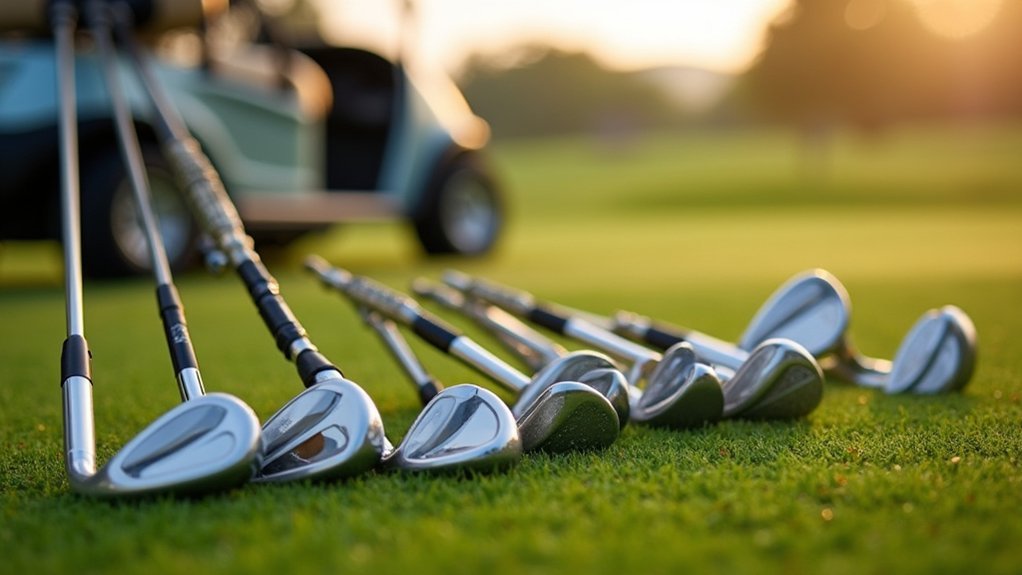
While physical limitations might present challenges on the golf course, the right equipment can transform a disabled player’s experience. Adaptive golf clubs featuring custom grips and lightweight shafts can greatly improve control and comfort during your swing.
If traditional swinging motions are difficult, consider swingless golf clubs that let you control distance without the typical swing action. These innovative clubs make the game more accessible and enjoyable regardless of mobility constraints.
Custom fitting is essential for optimizing your performance. A professional fitting accounts for your unique physical needs and swing characteristics, ensuring your clubs work with—not against—your body.
Don’t overlook specialized devices like the Eagle Claw grip aid, which enhances stability and accuracy for players with limited hand strength or dexterity.
Understanding the Benefits of Adaptive Golf Equipment
Because physical limitations shouldn’t prevent anyone from enjoying a round of golf, adaptive equipment has revolutionized accessibility for disabled players.
You’ll find that custom golf clubs tailored to your specific needs can dramatically improve your performance and comfort on the course.
Adaptive golf equipment includes adjustable shafts and specialized grips that accommodate various disabilities while maintaining swing control and consistency.
Grip aids and specialized tees simplify setup and execution without compromising your physical limitations.
Beyond clubs, adaptive golf carts with hand controls and swivel seats provide safer navigation across challenging terrain.
These mobility solutions guarantee you can focus on your game rather than course navigation concerns.
With the right equipment modifications, you’ll discover that golf remains accessible regardless of physical challenges.
Custom Club Length and Weight Modifications
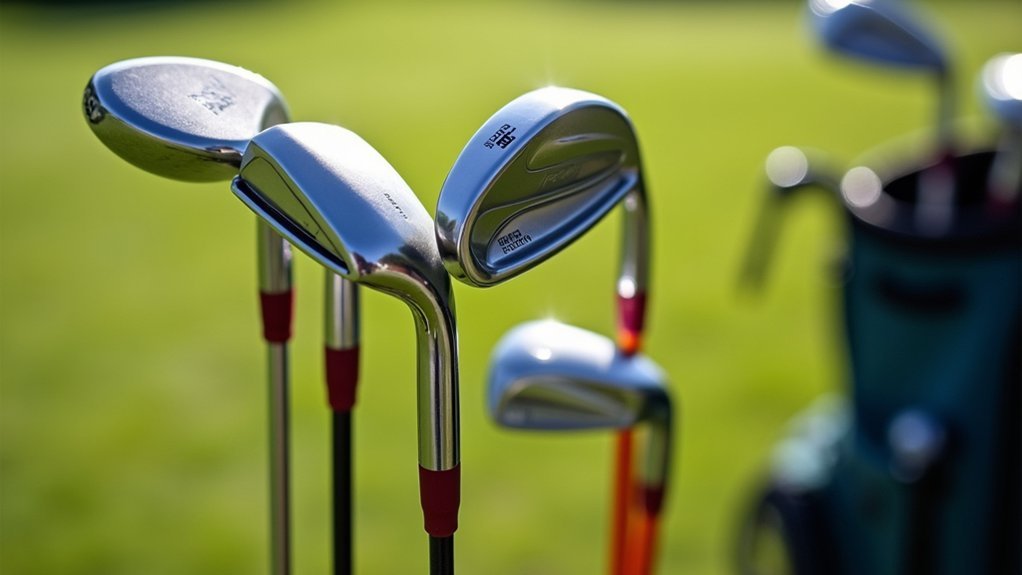
Precision in club modifications transforms the golfing experience for disabled players. Your custom club length directly impacts your posture and balance, enabling more natural swing mechanics tailored to your physical capabilities.
During the fitting process, professionals assess your swing characteristics to determine ideal specifications that match your unique needs.
Weight modifications provide significant advantages for players with strength limitations:
- Lighter clubs can increase your swing speed without causing excessive fatigue
- Balanced weight distribution improves your control throughout the swing motion
- Strategic weight placement helps compensate for specific physical limitations
Many manufacturers now offer these customization options, allowing you to fine-tune both length and weight parameters to your exact requirements.
These modifications aren’t just beneficial—they’re essential for maximizing your performance and enjoyment on the course.
Specialized Grip Options for Various Mobility Challenges
Specialized grip options complement custom length and weight modifications to create truly adaptive equipment for your game.
Products like the Eagle Claw help players with limited hand mobility by strengthening grip and maintaining control throughout your swing.
The Eagle Claw revolutionizes accessible golf, empowering players with mobility limitations to maintain confident control from address to follow-through.
If you’re facing dexterity challenges, consider the Quantum Grip, which combines a golf glove and grip for enhanced stability during your entire swing cycle.
Ergonomically designed grips accommodate various hand sizes and shapes, providing a more secure hold regardless of your specific needs.
You’ll find custom golf grips can be tailored to your preferences in thickness and texture, reducing slippage if you have reduced hand strength.
For arthritis or similar conditions, grip aids like rubber or foam extensions create a larger surface area, making it easier to maintain proper club control.
Single-Handed Golf Club Designs and Adaptations
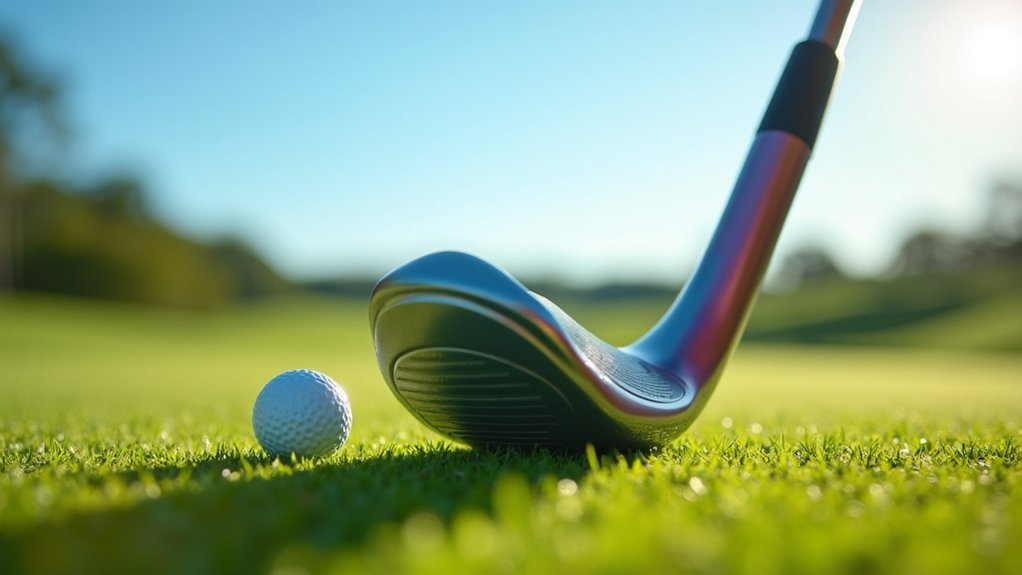
When you’re playing golf with one hand, having the right equipment becomes vital for both enjoyment and competitive play.
Single-handed golf club designs feature larger sweet spots that forgive off-center hits, while lightweight materials reduce strain during your swing. Ergonomic grips provide stability and control, helping you maintain proper technique despite mobility challenges.
Custom fittings are important—they guarantee your clubs match your unique physical requirements and playing style. Professional fitters can adjust shaft flex, lie angle, and club length to complement your one-handed technique.
- Look for clubs with adjustable weights to help balance your swing mechanics
- Consider specialized swing aids that promote proper one-handed form
- Invest in clubs with extended grips that allow multiple hand positions for versatility
Golf Clubs for Wheelchair Users and Seated Players
When playing golf from a wheelchair or seated position, you’ll need clubs with adaptive shaft designs that accommodate your unique setup.
Your seated swing mechanics require lighter shafts with appropriate flex and potentially larger grips to maintain control throughout your motion.
Custom-fitted equipment with the right length extensions can dramatically improve your ability to make consistent contact with the ball while maintaining stability.
Adaptive Shaft Design
Golf clubs designed for wheelchair users and seated players feature unique shaft modifications that address the distinctive challenges these athletes face.
You’ll find these adaptive shaft designs typically shorter and more flexible to accommodate your seated position and swing mechanics. Custom fittings are essential to guarantee the shaft angle and length match your specific needs and posture.
Manufacturers incorporate specialized grips that improve control for those with limited hand mobility, while utilizing lighter materials throughout the club to reduce weight for easier handling.
- Look for adjustable flex options that can be tailored to your specific swing strength and speed
- Consider the angle of the shaft relative to your seated position for ideal ball contact
- Prioritize clubs with balanced weight distribution to minimize strain during your swing
Seated Swing Mechanics
Since your body remains stationary, mastering seated swing mechanics requires adaptations to traditional techniques while maximizing your upper body rotation.
You’ll find that adaptive golf clubs designed specifically for seated swings can dramatically improve your game, featuring shorter shafts and lighter weights that accommodate wheelchair positioning.
Look for custom-built clubs that match your specific needs, with adjustable features that let you fine-tune grip size, shaft flex, and club length to your unique abilities.
Many manufacturers now offer these specialized options to optimize your swing mechanics from a seated position.
Consider using ball-stabilizing devices and specialized tees that provide consistency during setup.
Training programs focused on seated techniques can help you develop effective upper body rotation patterns while maintaining balance throughout your swing.
Swing-Assist Technology and Power Devices
Swingless power mechanisms revolutionize golf for players with mobility limitations, allowing you to control distances between 50-200 yards by simply pulling a trigger rather than executing a traditional swing.
These adaptive trigger controls enable precise shot-making while accommodating various disability types, giving you confidence to play without physical strain.
Launch-optimized club designs complement these technologies with customized weight distribution and grip modifications that enhance your ball contact even without a full swing motion.
Swingless Power Mechanisms
When traditional swing mechanics become challenging due to physical limitations, swingless power mechanisms offer a revolutionary solution for disabled golfers.
These innovative clubs utilize a power strip that activates when you pull a trigger, controlling ball distance from 50 to 200 yards without requiring a full swing. You’ll find that custom golf clubs fitted to your physical build make a significant difference in your game performance.
- Swing-assist technology maintains the joy of golf while accommodating mobility restrictions
- Virtual or in-person fitting processes guarantee accessibility regardless of your abilities
- Power mechanisms allow precise distance control while eliminating swing-related strain
With these adaptive clubs, you’re not just participating in golf—you’re enjoying the complete experience on your own terms, without compromise.
Adaptive Trigger Controls
Unlike traditional golf clubs that rely solely on physical swing power, adaptive trigger controls represent a breakthrough for players with disabilities. You’ll find these innovative devices allow you to engage the club’s power mechanism with a simple trigger pull, controlling distance without executing a full swing.
| Feature | Benefit | Best For |
|---|---|---|
| Trigger Sensitivity | Adjustable pressure settings | Limited grip strength |
| Distance Control | Precise yardage selection | Mobility restrictions |
| Custom Fitting | Tailored to your measurements | All physical limitations |
| Power Adjustment | Variable force settings | Different course conditions |
| Grip Options | Multiple handle designs | Hand dexterity issues |
Custom golf clubs with adaptive trigger controls can be specifically designed for your unique needs, with adjustable settings to match your capabilities. These specialized tools from brands like Power 2 Golf make the sport accessible regardless of your physical limitations.
Launch-Optimized Club Designs
Three revolutionary technologies define launch-efficient club designs for disabled golfers: swing-assist mechanisms, power-triggering devices, and customizable launch angles.
These innovations let you play without requiring a traditional full swing, making golf accessible regardless of mobility limitations.
Swing-assist technology helps you achieve ideal launch angles with minimal physical effort, while power devices offer precise distance control (50-200 yards) through simple trigger mechanisms.
You’ll find these clubs often feature adjustable settings to match your specific capabilities and forgiving heads that provide stability during contact.
- Look for clubs with larger, more forgiving heads that increase your accuracy despite limited range of motion.
- Consider power-triggering devices if you can’t perform conventional swings.
- Pair launch-efficient clubs with specialized grips for a complete adaptive solution.
Balance and Stability Features in Adaptive Clubs
Balance serves as the cornerstone of successful golf swings for players with disabilities. When you’re looking for adaptive clubs, prioritize those featuring a broader base design that enhances stability throughout your swing motion.
These specialized clubs offer superior weight distribution, giving you more confidence at address and during follow-through.
You’ll find many adaptive clubs incorporate ergonomic designs with specialized grips that prevent slippage and improve comfort during play.
The thoughtful integration of adjustable weights and counterbalancing technology allows you to customize each club to your specific needs.
Look for models made with lightweight materials that reduce body strain while maintaining structural integrity.
For maximum stability, consider using an adaptive golf cart with hand controls, enabling you to swing with proper balance while addressing mobility challenges.
Customizable Shaft Flexibility and Material Options
When selecting golf clubs that accommodate your specific needs, shaft customization becomes a critical factor in your overall success. You’ll find that customizable shaft flexibility allows you to match your swing speed, providing better control and distance regardless of your physical limitations.
Softer shaft materials can greatly reduce vibration and strain on your body, while different lengths can be tailored to your height and posture.
- Lighter shaft weights improve maneuverability when you have limited strength, making your swing more efficient and less taxing.
- Adjustable flex and torque settings allow for personalized adjustments as your capabilities change over time.
- Different shaft materials offer varying feedback sensations, helping you develop a consistent swing pattern that works with your body.
Prosthetic-Compatible Club Designs
Golfers using prosthetics can now enjoy a complete game thanks to innovative club designs specifically engineered for their unique requirements. Manufacturers like Ping and Callaway have pioneered prosthetic-compatible options featuring adjustable shafts and specialized grips that accommodate various physical needs.
Custom fitting services are essential when selecting these clubs, as they analyze your specific requirements and recommend appropriate modifications. Look for clubs with forgiving designs and larger heads that provide generous sweet spots, minimizing the impact of off-center hits.
The best prosthetic-friendly clubs incorporate lightweight materials and ergonomic designs that enhance comfort while improving swing mechanics. These adaptive options often include modified grips, flexible shafts, and customized lengths tailored to your playing style and physical abilities, ensuring you can perform at your best despite physical limitations.
Adaptive Putters for Enhanced Green Performance
While specialized club designs address the full swing, putting requires its own set of adaptations for disabled players. Adaptive putters like the L.A.B. Golf DF3 feature Lie Angle Balance technology that enhances stability and forgiveness on the green.
You’ll find many options with ergonomic designs that help you maintain comfortable grip and posture, vital for consistency in your putting stroke.
- The Bettinardi Inovai 6.5’s high MOI mallet design provides exceptional accuracy while accommodating various physical limitations.
- Adjustable putters can be personalized to your unique stance and swing requirements.
- One-handed use options enable effective participation without compromising performance.
These adaptive putters combine innovative technology with thoughtful design elements to guarantee the short game remains accessible and enjoyable, regardless of physical abilities.
Frequently Asked Questions
What Are the Best Clubs for High Handicap Golfers?
You’ll perform best with forgiveness-focused clubs like the Ping G430 Max 10K Driver, Callaway Elyte X Driver, Ping G730 or Mizuno JPX 925 Hot Metal HL Irons, and Cleveland CBX Full-Face 2 Wedges. Don’t skip custom fitting.
What Irons Are Best for a 5 Handicap?
As a 5 handicap, you’ll excel with Mizuno Pro 225 irons for precision, TaylorMade P790s for distance with forgiveness, Callaway Apex Pros for control, Titleist T100s for feedback, or Srixon ZX7s for workability while maintaining distance.
What Is the Best Set of Irons for a Mid-Handicap Golfer?
As a mid-handicapper, you’ll benefit most from game improvement irons like Mizuno JPX921 Hot Metal, Callaway Apex, Ping G425, or TaylorMade SIM2 Max. Don’t skip custom fitting—it’s essential for optimizing your shaft flex and club specs.
What Is the Easiest Set of Golf Clubs to Hit?
Game improvement irons like Ping G730 or Mizuno JPX 925 Hot Metal HL are easiest to hit. You’ll also benefit from forgiving drivers like Callaway Elyte X, hybrid clubs, and custom fitting to match your swing characteristics.
In Summary
You’ve now got the essentials for selecting adaptive golf clubs that match your specific needs. Whether it’s custom lengths, specialized grips, or single-handed designs, the right equipment can transform your game. Don’t hesitate to work with club fitters who understand disability adaptations. With today’s innovative options, you’re fully equipped to enjoy the course with confidence and improved performance.

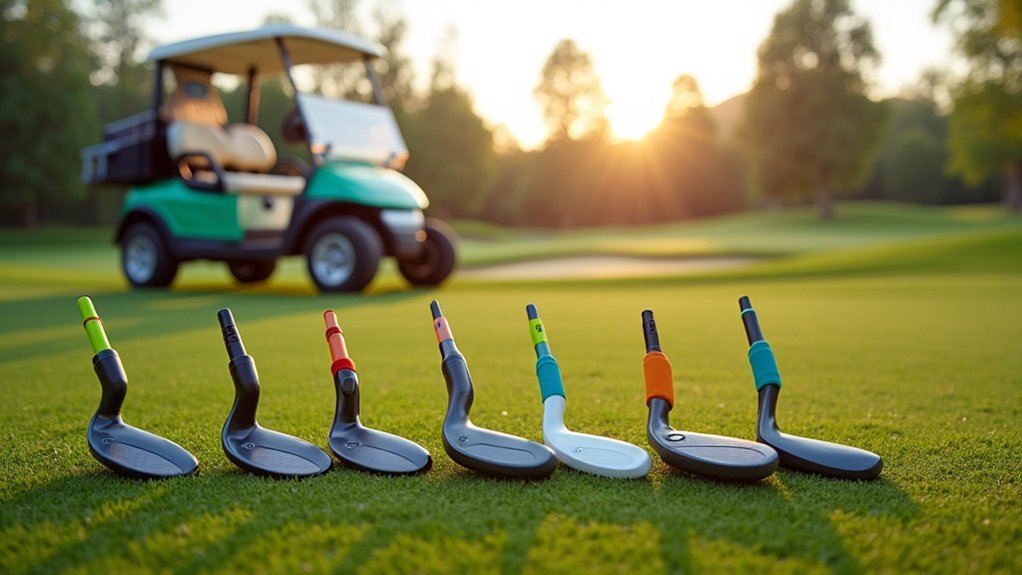
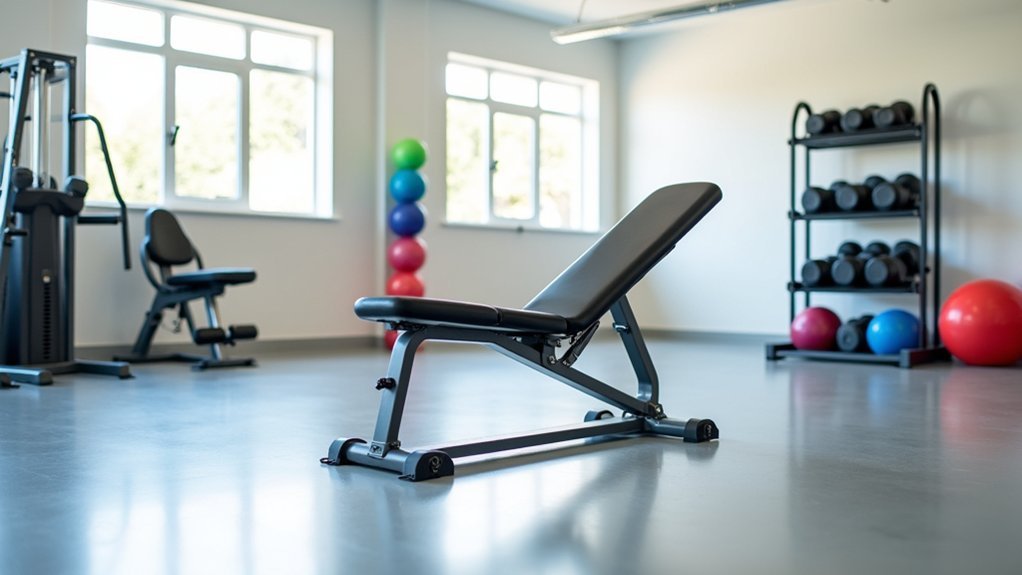
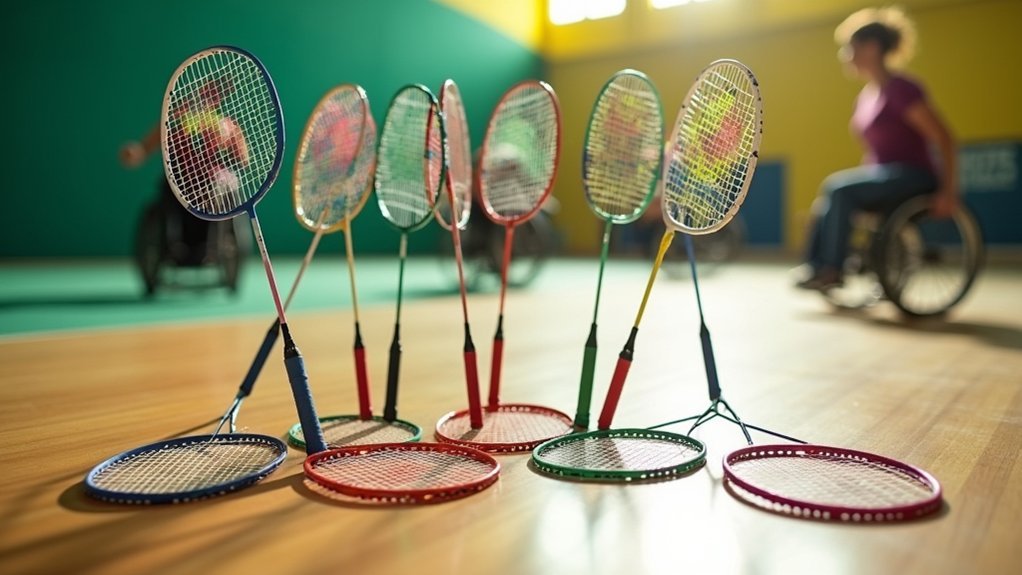
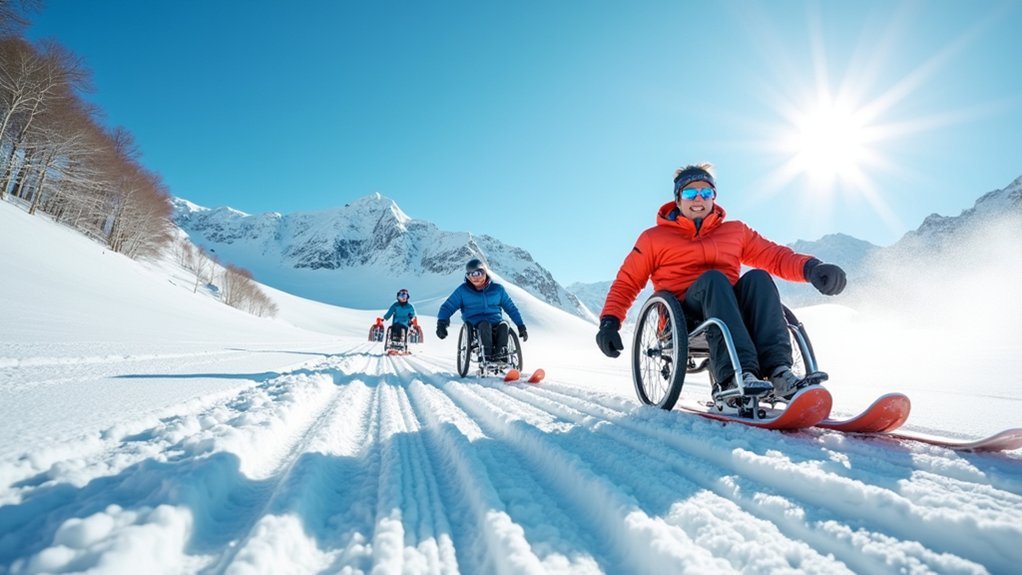
Leave a Reply